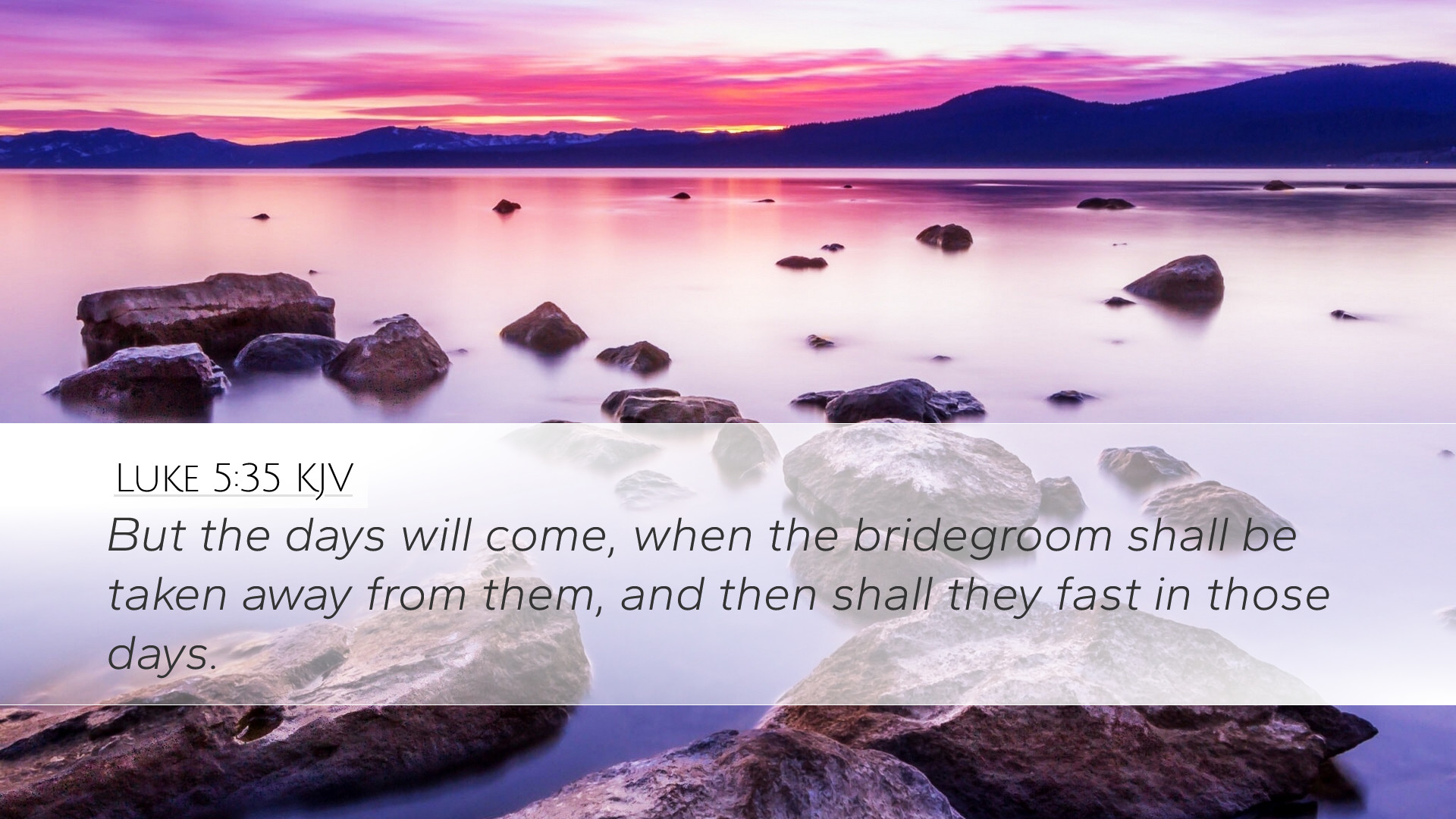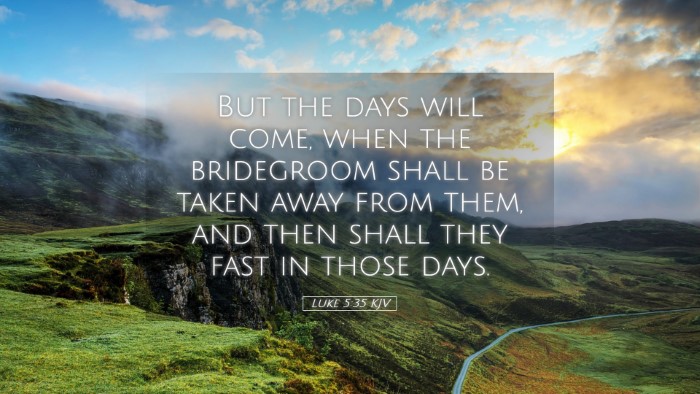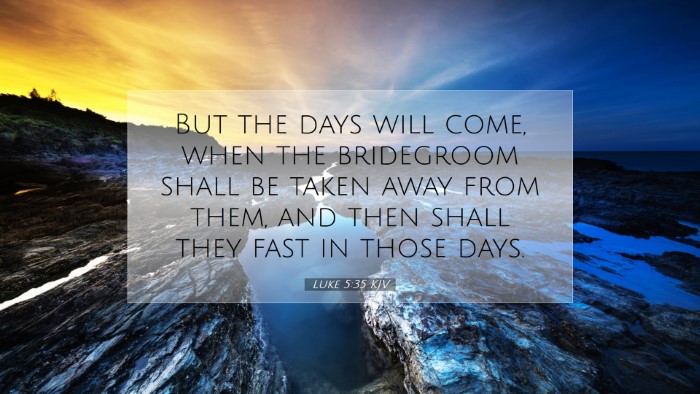Commentary on Luke 5:35
Verse: "But the days will come, when the bridegroom shall be taken away from them, and then shall they fast in those days."
Introduction
This profound statement made by Jesus encapsulates a critical theological truth about the nature of His ministry, the expectation of His followers, and the implications of His departure. The context of this verse revolves around the question regarding fasting, where Jesus contrasts the joy of His presence with the anticipated sorrow of His absence. This commentary examines various insights from esteemed public domain scholars, providing a rich tapestry of understanding for pastors, students, theologians, and Bible scholars.
Context and Interpretation
The surrounding passage discusses the nature of Jesus’ ministry as contrasting with the religious practices of the Pharisees. Here, the focus shifts to the metaphor of the bridegroom, a term filled with biblical significance reflecting joy, celebration, and intimacy.
Understanding the Bridegroom
Albert Barnes explains that the bridegroom symbolizes Christ Himself, who brings joy and fulfillment. In ancient Jewish culture, the presence of the bridegroom was a cause for celebration. His presence in the world is a time of rejoicing for His disciples and followers.
Matthew Henry emphasizes that the analogy to a bridegroom highlights the relationship between Christ and His church. Just as the bridegroom is joyfully celebrated, so too is Jesus the source of joy to His followers during His earthly ministry.
The Anticipation of Loss
Jesus’ statement about the bridegroom being taken away indicates an upcoming reality for His followers—the crucifixion and subsequent departure of His earthly presence. Adam Clarke notes that this foreshadowing serves as a poignant reminder of the sorrow and fasting that would come after His absence, underscoring the dual nature of the Christian experience encompassing both joy and mourning.
The Nature of Fasting
In examining the implications of fasting during the days of His absence, it is important to understand its significance in Jewish tradition. Fasting was often associated with mourning, repentance, and seeking divine intervention.
- Spiritual Preparation: Matthew Henry comments that fasting serves as a means of spiritual preparation, a way to express longing and dependence on God in times of absence. Just as the disciples would fast in anticipation of Christ’s return, so would believers today cultivate a heart of yearning for a deeper relationship with the Lord.
- Expression of Longing: Albert Barnes adds that fasting reflects a deep yearning for Christ’s presence. During the period of waiting for the bridegroom’s return, fasting becomes an expression of faith that acknowledges the current absence while fixating on future hope.
Theological Implications
This verse leads to rich theological discussions, especially as it pertains to the nature of the church's existence in the present age marked by both the presence of the Holy Spirit and the absence of Christ as the bridegroom.
- The Already but Not Yet: Adam Clarke articulates the concept of “the already but not yet” in Christian theology. The church experiences the presence of Christ spiritually through the Holy Spirit but awaits His physical return. Fasting becomes an appropriate response to this tension, marking the church’s vigilance and readiness.
- Communal Aspect of Fasting: Matthew Henry also addresses the communal aspect of fasting in the church, pointing out that it serves not only as an individual act of devotion but also as a collective expression of seeking God’s favor in anticipation of Christ’s return.
Practical Applications for Today
The rich insights derived from Luke 5:35 encourage believers to cultivate a lifestyle of waiting and expectancy in the midst of sorrow. There are several applications to consider:
- Encouraging Fasting: Pastors and leaders can encourage congregations to engage in fasting as a spiritual discipline. It serves as a time to focus on prayer, reflection, and anticipation of Christ’s second coming.
- Celebrating the Bridegroom: Cherishing moments of joy during worship services can enhance the community's understanding of the joy in Christ’s presence, reflecting back to the original celebrations described in Jesus’ analogy.
- Building Anticipation: As believers, fostering a sense of anticipation for Christ’s return brings hope amid trials and sorrows. Albert Barnes notes that maintaining this hope can rejuvenate faith, keeping the community united in purpose and vision.
Conclusion
In conclusion, Luke 5:35 serves as a rich source of theological reflection for the church. It invites believers to recognize both the joy found in Christ's presence and the sorrow found in His absence. Drawing on insights from Matthew Henry, Albert Barnes, and Adam Clarke, we see a nuanced understanding of fasting, the nature of Christ’s relationship with His followers, and the anticipation of His return. This passage urges a community rooted in hope and ready to engage in both joyful celebration and solemn waiting, embodying the fullness of the Christian experience.


